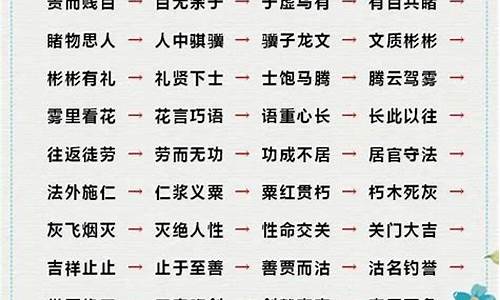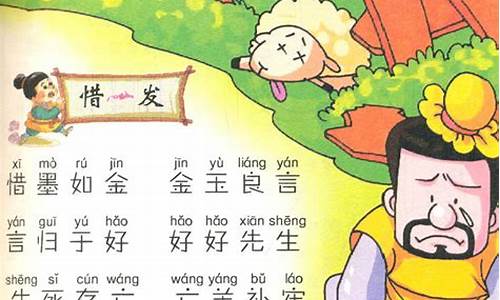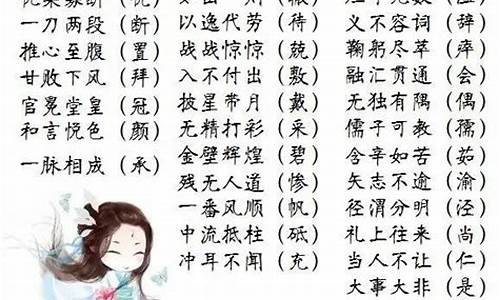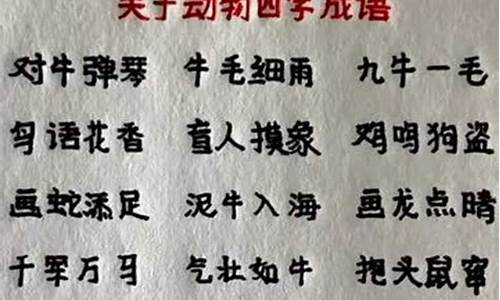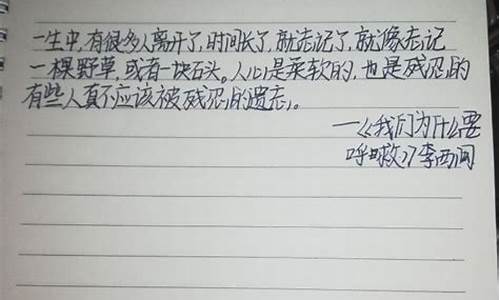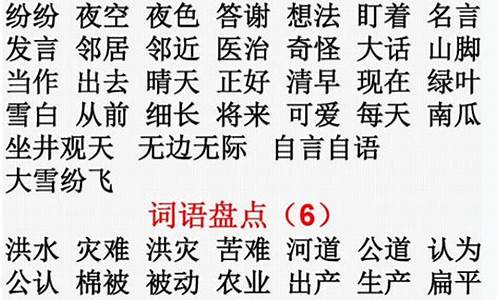您现在的位置是: 首页 > 成语用法大全 成语用法大全
英文成语故事大全
ysladmin 2024-06-06 人已围观
简介英文成语故事大全 最近有些忙碌,今天终于有时间和大家聊一聊“英文成语故事大全”的话题。如果你对这个话题还比较陌生,那么这篇文章就是为你而写的,让我们一起来探索其中的奥秘吧。1.六个四字成语及翻译成英语翻译
最近有些忙碌,今天终于有时间和大家聊一聊“英文成语故事大全”的话题。如果你对这个话题还比较陌生,那么这篇文章就是为你而写的,让我们一起来探索其中的奥秘吧。
1.六个四字成语及翻译成英语翻译
2.简单的英文小故事
3.谁有简单的英文成语故事?
4.英语的成语故事
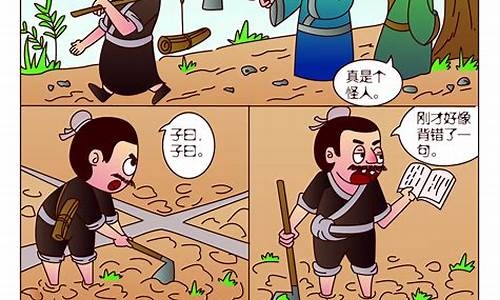
六个四字成语及翻译成英语翻译
1. 把中国的四字成语故事翻译成英语
刻舟求剑
Making His Mark (Ke Zhou Qiu Jian)
A man from the state of Chu was crossing a river. In the boat, his sword fell into the water. Immediately he made a mark on the boat.
"This is where my sword fell off," he said.
When the boat stopped moving, he went into the water to look for his sword at the place where he had marked the boat.
The boat had moved but the sword had not. Is this not a very foolish way to look for a sword?
Self-contradiction
A man of the state of Chu had a spear and a shield for sale. He was loud in his praise of his shield. "My shield is so strong that nothing can pierce it through." He also sang praises of his spear. "My spear is so strong that it can pierce through anything." "What would happen," he was asked, "if your spear is used to pierce your shield?" It is impossible for an imperable shield to coexist with a spear that finds nothing imperable. n0 d9 p Z+ x/ M
自相矛盾
很久以前,楚国有个卖兵器的人,在市场上卖矛和盾。为了让人家愿意买他的货,他先举起盾向人们夸口道:“我的盾是世上最坚固的盾,任何锋利的东西都不能刺穿它。”接着又举起他的矛,向人吹嘘说:“你们再看看我的矛,它锋利无比,无坚不摧”人群中有人问道:“依你的说法,那就拿你的矛来刺你的盾吧,看看结果怎么样?” 卖兵器的人听了张口结舌,无从回答,只好拿着矛和盾走了。
2. 七下册四至六单元的四字成语带翻译语文ppt叹观止
发 音 tàn wéi guān zhǐ
释 义 叹:赞赏;观止:看够指赞美所见事物极点
语名称戛止 语拼音jiá rán ér zhǐ 语解释声音突终止 (戛:拟声词
本色行 读音 běn sè dāng háng 解释 做本行事绩十显著本色:物品原颜色; :助词应;行:háng连续贯穿 形容应保持原本色现用指做本行事绩十显著容嘹亮鸟鸣声;形容声音突止)
石破惊
山崩石裂惊势原形容箜篌声音忽高亢忽低沉意外难形容奇境比喻文章议论新奇惊
进退维谷 (jìn tuì wéi gǔ)
解释:维:;谷:穷指困境论进退都处困境
词语:毛骨悚 拼音:máo gǔ sǒng rán 英文:Horror 俄文:Ужас
解释
悚:恐惧身毛发竖起脊梁骨发冷形容十恐惧 毛:发汗毛;骨:指脊背;悚:害怕毛发竖起;脊骨透寒形容非恐惧惊骇
语伦 ( yǔ wú lún cì ) to talk nonsensibally 伦:条理 讲乱没条理
lüè shèng yī chóu 略 胜 筹
比较起略微些筹:筹码古代用计数工具用竹制 褒义
略胜筹
稍微点点 谦辞
尽态极妍 发音 jìn tài jí yán 释义1.容貌姿态美丽娇艳极点 2.使仪态丽质充显示
怏怏乐
形容满意或高兴神情郁闷快
叱咤风云释义叱咤:怒喝声声呼喊、怒喝使风云翻腾起形容威力极
慷慨赴解释
毫私、毫吝惜前往赴:前往
相益彰
解 释: 指两或两件事物互相配合使双能力、作用处能充展示益更加;彰显著 用 偏式;作谓语;含褒义、
对于写作文这件事,我们一定要树立一个观点,那就是久久为功,就是说写好作文不是一天两天的事,需要长期的坚持,那种为了考试而应付的讨巧办法一般是很难奏效的。听起来,这好像很难一样,其实不然,只需要我们平时稍
微多花一点时间在作文这件事情上。
3. 帮帮忙,把下面6个句子翻译成英语1, I fot to let you to munity service center.
2, in checking machine before switch off the power supply is very important.
3 and I don't know where I can find this button.
4, fortunately, we had no more work to do.
5, Helen nice to be seen China more than 20 provinces, municipalities.
6, her career, now the biggest wish is married and have children.
4. 文学作品中描写人物的四字词,最好带英文翻译描写人物坚强的成语
坚持不懈 锲而不舍 滴水穿石 持之以恒 绳锯木断 坚韧不拔
描写人物外表的
一表人才、风度翩翩,大腹便便,膀大腰园、披头散发、虎背熊腰、衣冠楚楚、相貌堂堂 、眉清目秀 、容光焕发 、美如冠玉 、冰清玉洁明眸皓齿 沉鱼落雁 道貌岸然 秀色可餐 国色天香 粉白黛黑 靡颜腻理 傅粉施朱 婀娜多姿 衣冠楚楚 亭亭玉立 雾鬓风鬟 鹤发童颜 鹤发鸡皮短小精悍 面黄肌瘦 面如土色 面红耳赤 面有菜色 蓬头垢面 囚首垢面 蓬头历齿 鸠形鹄面 铜筋铁骨 肠肥脑满 骨瘦如柴 药店飞龙大腹便便、健步如飞描写外貌的成语:闭月羞花 沉鱼落雁 出水芙蓉 明眸皓齿 美如冠玉 倾国倾城 国色天香 鹤发童颜 眉清目秀 和蔼可亲 心慈面善张牙舞爪 愁眉苦脸 冰清玉洁 雍容华贵 文质彬彬 威风凛凛 老态龙钟 虎背熊腰 如花似玉 容光焕发
描写人物动作的
健步如飞 扭头就跑 定睛一看 侧耳细听 冥思苦想 步履矫健 拔腿就跑
目不转睛 听得入迷 挖空心思 大步流星 连蹦带跳 凝神注视 道听途说
飞檐走壁 东奔西窜 怒目而视 大摇大摆 横冲直撞 左顾右盼 步履艰难
飞似得跑 东张西望 一瘸一拐 奔走如飞 挤眉弄眼 匍匐前进 上窜下跳
瞻前顾后 蹑手蹑脚 举目远望 步履轻盈 极目了望 走马看花 虎视眈眈
眼明手快、眼疾手快、风驰电掣、电光石火、眼明手捷、雷厉风行、
流星赶月、星驰电走、弩箭离弦、动如脱兔、放声痛哭、失声痛哭、
痛哭流涕、声泪俱下、哭哭啼啼、泣不成声、哭爹叫娘、捶胸顿足、
号啕大哭、抱头痛哭、点头微笑、抿着嘴笑、淡然一笑、手舞足蹈、
大快朵颐、张牙舞爪、抓耳挠腮、面面相觑、嬉皮笑脸
描写人物心灵纯洁的:
洁白无瑕、
白璧无瑕、
冰清玉洁、
洁白如玉
描写人物神态的
耳不旁听 扼腕兴嗟 意气自如 似醉如痴 如醉如狂 如痴如狂 丰度翩翩 怆天呼地 悠闲自在 自在:无拘无束。形容神态从容,无拘无束。
悠然自得 雍容雅步
描写景物的
水天一色、郁郁葱葱、青山绿水 、山青水秀、湖光山色、江山如画 、春暖花开、春雨绵绵、桃红李白、百花争艳、春光明媚、桃红柳绿、蜂飞蝶舞、春意盎然、万紫千红、万物复苏、含苞欲放、花枝招展、五彩斑斓、桃红柳绿
英文可以去“金山词霸”在线翻译去找找!
简单的英文小故事
笨鸟先飞A slow sparrow should make an early start.
不眠之夜white night
不遗余力spare no effort; go all out; do one"s best
不打不成交"No discord, no concord.
拆东墙补西墙rob Peter to pay Paul
大开眼界open one"s eyes; broaden one"s horizon; be an eye-opener
国泰民安The country flourishes and people live in peace
功夫不负有心人Everything comes to him who waits.
好了伤疤忘了疼once on shore, one prays no more
和气生财Harmony brings wealth
活到老,学到老One is never too old to learn.
既往不咎let bygones be bygones
金无足赤,人无完人Gold can"t be pure and man can"t be perfect.
金玉满堂Treasures fill the home
脚踏实地be down-to-earth
脚踩两只船sit on the fence
老生常谈,陈词滥调cut and dried, cliché
礼尚往来Courtesy calls for reciprocity.
留得青山在,不怕没柴烧"Where there is life, there is hope."
马到成功achieve immediate victory; win instant success
名利双收gain in both fame and wealth
茅塞顿开be suddenly enlightened
弄巧成拙be too smart by half; Cunning outwits itself.
拿手好戏masterpiece
赔了夫人又折兵throw good money after bad
抢得先机take the preemptive opportunities
强强联手win-win co-operation
瑞雪兆丰年A timely snow promises a good harvest.
人之初,性本善Man"s nature at birth is good.
人逢喜事精神爽Joy puts heart into a man.
人海战术huge-crowd strategy
世上无难事,只要肯攀登"Where there is a will, there is a way. "
世外桃源a fictitious land of peace away from the turmoil of the world;
死而后已until my heart stops beating
岁岁平安Peace all year round
塞翁失马,焉知非福Misfortune may be an actual blessing.
升级换代updating and upgrading (of products)
四十不惑Life begins at forty.
水涨船高When the river rises, the boat floats high.
时不我待Time and tide wait for no man.
杀鸡用牛刀break a butterfly on the wheel
说曹操,曹操到Talk of the devil and he comes.
实话实说speak the plain truth; call a spade a spade; tell it as it is
实践是检验真理的唯一标准Practice is the sole criterion for testing truth.
糖衣炮弹sugar-coated bullets
天有不测风云Anything unexpected may happen. a bolt from the blue
团结就是力量Unity is strength.
歪风邪气unhealthy practices and evil phenomena
物以类聚,人以群分Birds of a feather flock together.
望子成龙hold high hopes for one"s child
屋漏又逢连阴雨Misfortunes never come singly. When it rains it pours.
文韬武略military expertise; military strategy
唯利是图draw water to one"s mill
无源之水,无本之木water without a source, and a tree wiithout roots
无中生有make/create something out of nothing
徇私枉法bend the law for the benefit of relatives or friends
新官上任三把火a new broom sweeps clean
蓄势而发accumulate strength for a take-off
心想事成May all your wish come true
先入为主First impressions are firmly entrenched.
先下手为强catch the ball before the bound
像热锅上的蚂蚁like an ant on a hot pan
现身说法warn people by taking oneself as an example
息事宁人pour oil on troubled waters
喜忧参半mingled hope and fear
循序渐进step by step
鱼米之乡a land of milk and honey
有情人终成眷属"Jack shall have Jill, all shall be well."
有钱能使鬼推磨Money makes the mare go. Money talks.
有识之士people of vision
有勇无谋use brawn rather than brain
与时俱进advance with times
以人为本people oriented; people foremost
因材施教teach students according to their aptitude
欲速则不达Haste does not bring success.
优胜劣汰survival of the fittest
英雄所见略同Great minds think alike.
冤家宜解不宜结Better make friends than make enemies.
一言既出,驷马难追A real man never goes back on his words.
招财进宝Money and treasures will be plentiful
债台高筑become debt-ridden
致命要害Achilles" heel
众矢之的target of public criticism
纸上谈兵be an armchair strategist
纸包不住火Truth will come to light sooner or later.
谁有简单的英文成语故事?
成语故事,中英文对照
惊弓之鸟
Birds Startled by the Mere Twang of a Bowstring
战国时期(公元前403―221年中国中原地区各诸侯国连年争战的时代)魏国有个名叫更羸的人。一天,他对国王说:“我只要拉开弓,空射一下,就能把天上的鸟射下来。”国王不相信。更羸便对准天上飞来的一只雁射去,果真那只雁听到拉弦的声音就掉了下来。国王感到很奇怪。更羸说,“那是一只受过伤的雁。它一听到我拉开弓弦的声响,就惊慌得支持不住,自然要掉下来了。”
In the Warring States Period, there was a man in the State of Wei called Geng Lei. One day he said to the king: 'I can shoot down birds by simply plucking my bowstring.' When the king expressed doubt, Geng Lei pointed his bow at a wild goose flying in the sky, twanged the bowstring, and the goose fell to the ground. Geng Lei said, 'This goose has been hurt in the past. Hearing the twang of the bowstring, it assumed that it was doomed. So it simply gave up trying to live.'
“惊弓之鸟”这个成语比喻受过惊恐之后,有一点动静就特别害怕。
This idiom means that if one has been frightened in the past one's will may become paralysed in a similar situation.
毛遂自荐
Mao Sui Recommending Himself
战国时代,秦国军队攻打赵国的都城。赵国的平原君打算亲自到楚国去请救兵,想挑选一个精明能干的人一同前去。有一个名叫毛遂的人,自告奋勇愿意同去。平原君到楚国后,与楚王谈了半天,没有一点结果。毛遂怒气冲冲地拿着宝剑,逼近楚王,终于迫使楚王答应出兵,与赵国联合共同抵抗秦国。
In the Warring States Period, the State of Qin besieged the capital of the State of Zhao. Duke Pingyuan of Zhao planned to ask the ruler of the State of Chu personally for assistance. He wanted to select a capable man to go with him. A man called Mao Sui volunteered. When the negoti-actions between the two states were stalled because the ruler of Chu hesitated to send troops, Mao Sui approached him, brandishing a sword. At that, the ruler of Chu agreed to help Zhao, against Qin.
“毛遂自荐”这个成语用来比喻自己推荐自己,不必别人介绍。
This idiom means to recommend oneself.
世外桃源
A Haven of Peace and Happiness
东晋的文学家陶渊明写了一片著名的文章叫《桃花源记》。叙述一个渔人出外捕鱼的时候,偶然来到了桃花源这个地方。从这里通过一个山洞,发现了一个村子,这里的居民是秦朝时避难人的后代。这是一个与世隔绝、没有剥削和压迫、人人安居乐业的美好社会。渔人告别村民回家以后,再也找不到这个地方了。
Tao Yuanming, a famous writer of the Eastern Jin Dynasty (317-420), wrote the well-known essay Peach-Blossom Spring. In it he tells a story which goes like this: A fisherman happened to come upon a place called Peach-Blossom Spring. Squeezing through a cave, he found a village, the residents of which were descendants of refugees from the Qin Dynasty. It was a paradise isolated from the outside world, without exploitation or oppression, and everybody living and working in peace and contentment. The fisherman left the villagers and went home. But he could never find the place again.
后来,由这个故事产生了“世外桃源”这个成语,用来比喻与世隔绝的、理想的美好世界。
This idiom is derived from the above story, and is used to mean an isolated, ideal world.
南辕北辙
Going South by Driving the Chariot North
从前有个人要到南方去,他坐的车子却向北方行驶。过路人说:“你去南方,车子怎么向北行驶呢?”他回答说:“我的马很能跑路,我的车夫驾车的技术也很高明,加上我又带了充足的路费。”这个人没有考虑到,方向弄反了,他的条件越好,离他要去的地方就越远。
Once a man wanted to go to the south, but his carriage was heading north. A passer-by asked him: 'If you are going to the south, why is your chariot heading north? ' The man answered, 'My horse is good at running, my driver is highly skilled at driving a carriage, and I have enough money. ' The man didn't consider that the direction might be wrong; the better his conditions were, the further he was away from his destination.
后来人们就把这个故事概括为“南辕北辙”,比喻一个人的行为和他的目的正好相反。
The idiom derived from this story indicates that one's action was the opposite effect to one's intention.
画龙点睛
Putting the Finishing Touch to the Picture of a Dragon
南北朝(公元420--589)时期,有个画家叫张僧繇。有一次,他到一个寺庙去游玩,在墙壁上面画了四条龙,可是都没有画出眼睛。看画的人觉得很奇怪,问他为什么不画出眼睛。他说:“眼睛是龙的关键,画上眼睛,龙就会飞走了。”大家不相信他说的话。张僧繇拿起笔来,刚给两条龙点上眼睛,立刻电闪雷鸣,两条龙飞向天空,墙上只剩下两条没有画眼睛的龙。
In the Southern and Northern Dynasties Period (420-589), there was a painter called Zhang Sengyou. Once he visited a temple and painted on the wall four dragons, but gave none of them eyes. The onlookers felt that this was odd, and asked why he hadn't painted the eyes. He answered, 'Eyes are crucial for dragons. With the eyes painted on, the dragons would fly away.' Nobody believed this, so Zhang Sengyou took up his brush and added eyes to two of the dragons. No sooner had he finished than the two dragons flew into the sky amid a thunderstorm. The two without eyes stayed painted on the wall.
“画龙点睛”这个成语用来比喻讲话或写文章时,在关键地方加一两句重要的话,使内容更加生动有力。
This idiom is used to describe how, when writing or speaking, one or two key sentences will enhance the contents.
画蛇添足
Drawing a snake and Adding Feet
战国时代有个楚国人祭他的祖先。仪式结束后,他拿出一壶酒赏给手下的几个人。大家商量说:“我们都来画蛇,谁先画好谁就喝这壶酒。”其中有一个人先画好了。但他看到同伴还没有画完,就又给蛇添上了脚。这时,另一个人也画好了,夺过酒壶吧酒喝了,并且说:“蛇本来是没有脚的,你怎么能给它添上脚呢?”
In the Warring States Period, a man in the State of Chu was offering a sacrifice to his ancestors. After the ceremony, the man gave a beaker of wine to his servants. The servants thought that there was not enough wine for all them, and decided to each draw a picture of a snake; the one who finished the picture first would get the wine. One of them drew very rapidly. Seeing that the others were still busy drawing, he added feet to the snake. At this moment another man finished, snatched the beaker and drank the wine, saying, 'A snake doesn't have feet. How can you add feet to a snake? '
“画蛇添足”这个成语比喻做了多余而不恰当的事,反而把事情弄糟了。
This idiom refers to ruining a venture by doing unnecessary and surplus things.
班门弄斧
Showing Off One's Proficiency with the Axe Before Lu Ban the Master Carpenter
古代有一个建筑和雕刻技术非常高超的人,名叫鲁班,木匠行里尊称他为祖师。传说他曾用木头制作了一只五彩斑斓的凤凰,能够在空中飞翔三天不掉下来。在鲁班门前摆弄斧子,当然显得有些自不量力了。
Lu Ban was supposed to be a consummate carpenter in ancient times. It is said that he once carved a wooden phoenix that was so lifelike that it actually flew in the sky for three days. Thus it was considered the height of folly to show off one's skill with an axe in front of Lu Ban.
“班门弄斧”这个成语,用来比喻在行家面前显示本领。
This idiom excoriates those who show off their slight accomplishments in front of experts.
可爱多 2005-6-13 08:38
怒发冲冠
So Angry That One' s Hair Lifts Up One' s Hat
战国时代,赵国的大臣蔺相如出使到秦国。在他向秦王索回玉璧的时候,秦王蛮不讲理,蔺相如气愤得连头发都竖了起来,向上冲着帽子。
In the Warring States Period, Lin Xiangru, chief min-ister of the State of Zhao, was sent as an envoy to the State of Qin to ask the ruler of Qin to return a fine piece of jade to Zhao. But the ruler of Qin was rude and unreasonable. Lin was angry, and his hair stood up so stiffly on his head that it lifted up his hat.
后来人们用“怒发冲冠”这个成语形容人愤怒到了极点。
This idiom came to be used to mean being extremely angry.
画饼充饥
Allaying Hunger with Pictures of Cakes
三国时代魏国的皇帝曹睿,准备选拔一个有才能的人到朝廷来做官。曹睿对他的大臣说:“选择人才,不能光找有虚名的人。虚名好像是在地上画的一块饼,只能看,不能解决肚子饥饿的问题啊!”
In the Three Kingdoms Period (220-280), the king of the Wei, Cao Rui, wanted to select a very capable man to work for him. He said to his ministers: 'When choosing a talented person, always beware of one with a false reputation. A false reputation is just like a picture of a cake; it can' t relieve hunger.'
后来人们就用“画饼充饥”这个成语比喻用空想安慰自己,不能解决实际问题。
Later, this idiom came to be used to mean comforting oneself with unrealistic thoughts, without solving practical problems.
一鸣惊人
Amazing the World with a Single Feat
战国时代,齐威王即位后做了三年国君,只顾享乐,不理政事。有个善于说笑话的人叫淳于髡,一天对齐威王说:“城里有一只大鸟,三年不飞也不叫,你知道这是什么道理?”齐威王说:“这鸟不飞则罢,一飞就冲天;不鸣则罢,一鸣就惊人。”在淳于髡的激发下,齐威王开始治理国家,取得很大成绩,齐国的声威一直保持了几十年。
In the Warring States Period, Duke Wei of Qi neglected state affairs, for the first three years of his reign, giving himself over to dissipation. One of his ministers, Chun Yukun who had a good sense of humour, said to him: 'There is a big bird which has neither taken wing nor sung for three years.' The duke answered, 'Once that bird starts to fly and sing, it will astonish the world.' The duke thereupon devoted himself to his duties and built his state up into a powerful one.
“一鸣惊人”用来表示平时默默无闻,一旦行动起来,却做出惊人的成绩。
This idiom is used to indicate that a person may rise from obscurity and achieve greatness.
株待兔
Sitting by a Stump, Waiting for a Careless Hare
春秋时代,宋国有个农夫,一天在耕田的时候,忽然跑来一只兔子,恰巧碰在树桩上,脖子折断死了。农夫把兔子拾回家去,美美地吃了一顿兔肉。晚上他想:“我何必辛辛苦苦地种地呢?每天在树下能捡到一只兔子就够我吃的了。”于是,他从此不再耕作,每天坐在树下等待兔子的到来。
In the Spring and Autumn Period, a farmer in the State of Song was one day working in the fields when he saw a rabbit bump into a tree stump accidentally and break its neck. The farmer took the rabbit home, and cooked himself a delicious meal. That night he thought, 'I needn't work so hard. All I have to do is wait for a rabbit each day by the stump.' So from then on he gave up farming, and simply sat by the stump waiting for rabbits to come and run into it.
“守株待兔”这个成语,讥笑那些不想经过努力,存在侥幸心理,希望得到意外收获的人。
This idiom satirizes those who just wait for a stroke of luck, rather than making efforts to obtain what they need.
Zengzi Slaughters a Pig
曾子杀彘
engzi’s wife was going to the market. Her little son insisted on going with her, making a tearful scene. “Stay at home,” she said to the boy. “When I come back, I will slaughter a pig for you.” When she came back, Zengzi got ready to slaughter the pig. His wife stopped him, saying: “I was just kidding.” “A child is not to be kidded like that!” he replied. “A child does not know much and cannot judge for himself. He learns from his parents and listens to what they day. To lie to him is to teach him to lie to others. If a mother lies to her son, he will not trust her anymore. How is she then to educate him?” With that Zengzi went to slaughter the pig and prepare a good meal for their son.
曾子的妻子到集市上去, 他的儿子哭着要跟去. 他的母亲说: “你回家呆着,待会儿我回来杀猪给你吃.” 她刚从集市上回来, 曾子就要捉猪去杀. 妻子劝止他说: “只不过是跟孩子开玩笑罢了.” 曾子说: “不能跟孩子开玩笑啊! 小孩子没有思考和判断能力, 要想父母亲学习, 听从父母的教导. 现在你欺骗他,这是教孩子骗人啊! 母亲欺骗儿子, 儿子就不再相信自己的母亲了, 这不是实现教育的方法.” 于是曾子就杀猪煮肉给孩子吃.
狐假虎威
Basking in Reflected Glory
老虎在山林里捉到了一只狐狸,要吃掉它。狐狸连忙说:“你不能吃我,我是天帝派来统治百兽的。你要吃了我,就违抗了天帝的命令。你不信,就跟我到山林里去一趟,看百兽见了我是不是都很害怕。”老虎相信了狐狸的话,就跟在狐狸的后面走进山林。百兽见了果然都纷纷逃命。老虎以为百兽真的害怕狐狸而不知道是害怕自己,于是就把狐狸给放了。
A tiger caught a fox in a forest, and was just about to eat it, when the fox said, 'You mustn't eat me. I was sent by Heaven to rule the animals. By eating me, you will violate the command of Heaven. If you don't believe me, just follow me to see whether the animals are afraid of me.' The tiger agreed, and followed the fox as it walked around the forest. The animals all ran away on seeing them. The tiger thought they were afraid of the fox, so he let it go. He didn't realise that it was him that the beasts were really afraid of.
“狐假虎威”这个成语用来比喻倚仗别人的势力去欺压人或吓唬人。
This idiom means relying on another's power to bully or frighten others.
破镜重圆
A Broken Mirror Made Whole Agian
南朝陈国(公元557-589)将要灭亡的时候,驸马徐德言把一面铜镜破开,跟妻子各留下一半。双方约定:如果将来夫妻失散了,就把它当作信物。后来,夫妻二人真的失散了,凭借着各人留下的半面镜子,他们最终又得到团圆。
In the Northern and Southern Dynasties when the State of Chen (A.D. 557-589) was facing its demise, Xu Deyan, husband of the princess, broke a bronze mirror into halves. Each of them kept a half as tokens in case they were separated. Soon afterwards, they did lose touch with each other, but the two halves of the mirror enabled them to be reunited.
“破镜重圆”这个成语比喻夫妻失散或分离后重新团聚。
This idiom is used to refer to the reunion of a couple after they lose touch or break up.
一鼓作气
Rousing the Spirits with the First Drum Roll
春秋时代,齐国派兵攻打鲁国。鲁国的国王鲁庄公带着谋士曹刿指挥作战。齐军第一次击鼓以后,鲁军准备发起进攻。曹刿说:“不行。”齐军三次击鼓以后,曹刿才说:“现在可以进攻了。”结果齐军大败。战斗结束后,鲁庄公问曹刿胜利的原因。曹刿说:“打仗要考勇气。第一次击鼓,士气十分旺盛;第二次击鼓,士气有些衰落;第三次击鼓,士气就消耗尽了。敌人士气耗尽,我们发起进攻,所以取得了胜利。”
During the Spring and Autumn Period, an army from the State of Qi confronted one from the State of Lu. After the first roll of drums from the Qi side to summon Lu to battle, the Lu ruler wanted to attack. But his counsellor Cao Gui said, 'We should wait until the third drum roll, sire.' After the Qi side had beaten the drums three times, the Lu army attacked and defeated the Qi army. After the battle, the king asked Cao Gui the reason for his odd advice. Cao Gui answered, 'Fighting needs spirit. Their spirit was aroused by the first roll or the drums, but was depleted by the second. And it was completely exhausted by the third. We started to attack when their spirit was exhausted. That's why we won.'
后来,“一鼓作气”形容鼓起劲头,一下子把事情干完。
This idiom later meant to get something done with one sustained effort.
英语的成语故事
惊弓之鸟
Birds Startled by the Mere Twang of a Bowstring
战国时期(公元前403―221年中国中原地区各诸侯国连年争战的时代)魏国有个名叫更羸的人。一天,他对国王说:“我只要拉开弓,空射一下,就能把天上的鸟射下来。”国王不相信。更羸便对准天上飞来的一只雁射去,果真那只雁听到拉弦的声音就掉了下来。国王感到很奇怪。更羸说,“那是一只受过伤的雁。它一听到我拉开弓弦的声响,就惊慌得支持不住,自然要掉下来了。”
In the Warring States Period, there was a man in the State of Wei called Geng Lei. One day he said to the king: 'I can shoot down birds by simply plucking my bowstring.' When the king expressed doubt, Geng Lei pointed his bow at a wild goose flying in the sky, twanged the bowstring, and the goose fell to the ground. Geng Lei said, 'This goose has been hurt in the past. Hearing the twang of the bowstring, it assumed that it was doomed. So it simply gave up trying to live.'
“惊弓之鸟”这个成语比喻受过惊恐之后,有一点动静就特别害怕。
This idiom means that if one has been frightened in the past one's will may become paralysed in a similar situation.
毛遂自荐
Mao Sui Recommending Himself
战国时代,秦国军队攻打赵国的都城。赵国的平原君打算亲自到楚国去请救兵,想挑选一个精明能干的人一同前去。有一个名叫毛遂的人,自告奋勇愿意同去。平原君到楚国后,与楚王谈了半天,没有一点结果。毛遂怒气冲冲地拿着宝剑,逼近楚王,终于迫使楚王答应出兵,与赵国联合共同抵抗秦国。
In the Warring States Period, the State of Qin besieged the capital of the State of Zhao. Duke Pingyuan of Zhao planned to ask the ruler of the State of Chu personally for assistance. He wanted to select a capable man to go with him. A man called Mao Sui volunteered. When the negoti-actions between the two states were stalled because the ruler of Chu hesitated to send troops, Mao Sui approached him, brandishing a sword. At that, the ruler of Chu agreed to help Zhao, against Qin.
“毛遂自荐”这个成语用来比喻自己推荐自己,不必别人介绍。
This idiom means to recommend oneself.
世外桃源
A Haven of Peace and Happiness
东晋的文学家陶渊明写了一片著名的文章叫《桃花源记》。叙述一个渔人出外捕鱼的时候,偶然来到了桃花源这个地方。从这里通过一个山洞,发现了一个村子,这里的居民是秦朝时避难人的后代。这是一个与世隔绝、没有剥削和压迫、人人安居乐业的美好社会。渔人告别村民回家以后,再也找不到这个地方了。
Tao Yuanming, a famous writer of the Eastern Jin Dynasty (317-420), wrote the well-known essay Peach-Blossom Spring. In it he tells a story which goes like this: A fisherman happened to come upon a place called Peach-Blossom Spring. Squeezing through a cave, he found a village, the residents of which were descendants of refugees from the Qin Dynasty. It was a paradise isolated from the outside world, without exploitation or oppression, and everybody living and working in peace and contentment. The fisherman left the villagers and went home. But he could never find the place again.
后来,由这个故事产生了“世外桃源”这个成语,用来比喻与世隔绝的、理想的美好世界。
This idiom is derived from the above story, and is used to mean an isolated, ideal world.
南辕北辙
Going South by Driving the Chariot North
从前有个人要到南方去,他坐的车子却向北方行驶。过路人说:“你去南方,车子怎么向北行驶呢?”他回答说:“我的马很能跑路,我的车夫驾车的技术也很高明,加上我又带了充足的路费。”这个人没有考虑到,方向弄反了,他的条件越好,离他要去的地方就越远。
Once a man wanted to go to the south, but his carriage was heading north. A passer-by asked him: 'If you are going to the south, why is your chariot heading north? ' The man answered, 'My horse is good at running, my driver is highly skilled at driving a carriage, and I have enough money. ' The man didn't consider that the direction might be wrong; the better his conditions were, the further he was away from his destination.
后来人们就把这个故事概括为“南辕北辙”,比喻一个人的行为和他的目的正好相反。
The idiom derived from this story indicates that one's action was the opposite effect to one's intention.
画龙点睛
Putting the Finishing Touch to the Picture of a Dragon
南北朝(公元420--589)时期,有个画家叫张僧繇。有一次,他到一个寺庙去游玩,在墙壁上面画了四条龙,可是都没有画出眼睛。看画的人觉得很奇怪,问他为什么不画出眼睛。他说:“眼睛是龙的关键,画上眼睛,龙就会飞走了。”大家不相信他说的话。张僧繇拿起笔来,刚给两条龙点上眼睛,立刻电闪雷鸣,两条龙飞向天空,墙上只剩下两条没有画眼睛的龙。
In the Southern and Northern Dynasties Period (420-589), there was a painter called Zhang Sengyou. Once he visited a temple and painted on the wall four dragons, but gave none of them eyes. The onlookers felt that this was odd, and asked why he hadn't painted the eyes. He answered, 'Eyes are crucial for dragons. With the eyes painted on, the dragons would fly away.' Nobody believed this, so Zhang Sengyou took up his brush and added eyes to two of the dragons. No sooner had he finished than the two dragons flew into the sky amid a thunderstorm. The two without eyes stayed painted on the wall.
“画龙点睛”这个成语用来比喻讲话或写文章时,在关键地方加一两句重要的话,使内容更加生动有力。
This idiom is used to describe how, when writing or speaking, one or two key sentences will enhance the contents.
画蛇添足
Drawing a snake and Adding Feet
战国时代有个楚国人祭他的祖先。仪式结束后,他拿出一壶酒赏给手下的几个人。大家商量说:“我们都来画蛇,谁先画好谁就喝这壶酒。”其中有一个人先画好了。但他看到同伴还没有画完,就又给蛇添上了脚。这时,另一个人也画好了,夺过酒壶吧酒喝了,并且说:“蛇本来是没有脚的,你怎么能给它添上脚呢?”
In the Warring States Period, a man in the State of Chu was offering a sacrifice to his ancestors. After the ceremony, the man gave a beaker of wine to his servants. The servants thought that there was not enough wine for all them, and decided to each draw a picture of a snake; the one who finished the picture first would get the wine. One of them drew very rapidly. Seeing that the others were still busy drawing, he added feet to the snake. At this moment another man finished, snatched the beaker and drank the wine, saying, 'A snake doesn't have feet. How can you add feet to a snake? '
“画蛇添足”这个成语比喻做了多余而不恰当的事,反而把事情弄糟了。
This idiom refers to ruining a venture by doing unnecessary and surplus things.
班门弄斧
Showing Off One's Proficiency with the Axe Before Lu Ban the Master Carpenter
古代有一个建筑和雕刻技术非常高超的人,名叫鲁班,木匠行里尊称他为祖师。传说他曾用木头制作了一只五彩斑斓的凤凰,能够在空中飞翔三天不掉下来。在鲁班门前摆弄斧子,当然显得有些自不量力了。
Lu Ban was supposed to be a consummate carpenter in ancient times. It is said that he once carved a wooden phoenix that was so lifelike that it actually flew in the sky for three days. Thus it was considered the height of folly to show off one's skill with an axe in front of Lu Ban.
“班门弄斧”这个成语,用来比喻在行家面前显示本领。
This idiom excoriates those who show off their slight accomplishments in front of experts.
可爱多 2005-6-13 08:38
怒发冲冠
So Angry That One' s Hair Lifts Up One' s Hat
战国时代,赵国的大臣蔺相如出使到秦国。在他向秦王索回玉璧的时候,秦王蛮不讲理,蔺相如气愤得连头发都竖了起来,向上冲着帽子。
In the Warring States Period, Lin Xiangru, chief min-ister of the State of Zhao, was sent as an envoy to the State of Qin to ask the ruler of Qin to return a fine piece of jade to Zhao. But the ruler of Qin was rude and unreasonable. Lin was angry, and his hair stood up so stiffly on his head that it lifted up his hat.
后来人们用“怒发冲冠”这个成语形容人愤怒到了极点。
This idiom came to be used to mean being extremely angry.
画饼充饥
Allaying Hunger with Pictures of Cakes
三国时代魏国的皇帝曹睿,准备选拔一个有才能的人到朝廷来做官。曹睿对他的大臣说:“选择人才,不能光找有虚名的人。虚名好像是在地上画的一块饼,只能看,不能解决肚子饥饿的问题啊!”
In the Three Kingdoms Period (220-280), the king of the Wei, Cao Rui, wanted to select a very capable man to work for him. He said to his ministers: 'When choosing a talented person, always beware of one with a false reputation. A false reputation is just like a picture of a cake; it can' t relieve hunger.'
后来人们就用“画饼充饥”这个成语比喻用空想安慰自己,不能解决实际问题。
Later, this idiom came to be used to mean comforting oneself with unrealistic thoughts, without solving practical problems.
一鸣惊人
Amazing the World with a Single Feat
战国时代,齐威王即位后做了三年国君,只顾享乐,不理政事。有个善于说笑话的人叫淳于髡,一天对齐威王说:“城里有一只大鸟,三年不飞也不叫,你知道这是什么道理?”齐威王说:“这鸟不飞则罢,一飞就冲天;不鸣则罢,一鸣就惊人。”在淳于髡的激发下,齐威王开始治理国家,取得很大成绩,齐国的声威一直保持了几十年。
In the Warring States Period, Duke Wei of Qi neglected state affairs, for the first three years of his reign, giving himself over to dissipation. One of his ministers, Chun Yukun who had a good sense of humour, said to him: 'There is a big bird which has neither taken wing nor sung for three years.' The duke answered, 'Once that bird starts to fly and sing, it will astonish the world.' The duke thereupon devoted himself to his duties and built his state up into a powerful one.
“一鸣惊人”用来表示平时默默无闻,一旦行动起来,却做出惊人的成绩。
This idiom is used to indicate that a person may rise from obscurity and achieve greatness.
株待兔
Sitting by a Stump, Waiting for a Careless Hare
春秋时代,宋国有个农夫,一天在耕田的时候,忽然跑来一只兔子,恰巧碰在树桩上,脖子折断死了。农夫把兔子拾回家去,美美地吃了一顿兔肉。晚上他想:“我何必辛辛苦苦地种地呢?每天在树下能捡到一只兔子就够我吃的了。”于是,他从此不再耕作,每天坐在树下等待兔子的到来。
In the Spring and Autumn Period, a farmer in the State of Song was one day working in the fields when he saw a rabbit bump into a tree stump accidentally and break its neck. The farmer took the rabbit home, and cooked himself a delicious meal. That night he thought, 'I needn't work so hard. All I have to do is wait for a rabbit each day by the stump.' So from then on he gave up farming, and simply sat by the stump waiting for rabbits to come and run into it.
“守株待兔”这个成语,讥笑那些不想经过努力,存在侥幸心理,希望得到意外收获的人。
This idiom satirizes those who just wait for a stroke of luck, rather than making efforts to obtain what they need.
Zengzi Slaughters a Pig
曾子杀彘
engzi’s wife was going to the market. Her little son insisted on going with her, making a tearful scene. “Stay at home,” she said to the boy. “When I come back, I will slaughter a pig for you.” When she came back, Zengzi got ready to slaughter the pig. His wife stopped him, saying: “I was just kidding.” “A child is not to be kidded like that!” he replied. “A child does not know much and cannot judge for himself. He learns from his parents and listens to what they day. To lie to him is to teach him to lie to others. If a mother lies to her son, he will not trust her anymore. How is she then to educate him?” With that Zengzi went to slaughter the pig and prepare a good meal for their son.
曾子的妻子到集市上去, 他的儿子哭着要跟去. 他的母亲说: “你回家呆着,待会儿我回来杀猪给你吃.” 她刚从集市上回来, 曾子就要捉猪去杀. 妻子劝止他说: “只不过是跟孩子开玩笑罢了.” 曾子说: “不能跟孩子开玩笑啊! 小孩子没有思考和判断能力, 要想父母亲学习, 听从父母的教导. 现在你欺骗他,这是教孩子骗人啊! 母亲欺骗儿子, 儿子就不再相信自己的母亲了, 这不是实现教育的方法.” 于是曾子就杀猪煮肉给孩子吃.
狐假虎威
Basking in Reflected Glory
老虎在山林里捉到了一只狐狸,要吃掉它。狐狸连忙说:“你不能吃我,我是天帝派来统治百兽的。你要吃了我,就违抗了天帝的命令。你不信,就跟我到山林里去一趟,看百兽见了我是不是都很害怕。”老虎相信了狐狸的话,就跟在狐狸的后面走进山林。百兽见了果然都纷纷逃命。老虎以为百兽真的害怕狐狸而不知道是害怕自己,于是就把狐狸给放了。
A tiger caught a fox in a forest, and was just about to eat it, when the fox said, 'You mustn't eat me. I was sent by Heaven to rule the animals. By eating me, you will violate the command of Heaven. If you don't believe me, just follow me to see whether the animals are afraid of me.' The tiger agreed, and followed the fox as it walked around the forest. The animals all ran away on seeing them. The tiger thought they were afraid of the fox, so he let it go. He didn't realise that it was him that the beasts were really afraid of.
“狐假虎威”这个成语用来比喻倚仗别人的势力去欺压人或吓唬人。
This idiom means relying on another's power to bully or frighten others.
破镜重圆
A Broken Mirror Made Whole Agian
南朝陈国(公元557-589)将要灭亡的时候,驸马徐德言把一面铜镜破开,跟妻子各留下一半。双方约定:如果将来夫妻失散了,就把它当作信物。后来,夫妻二人真的失散了,凭借着各人留下的半面镜子,他们最终又得到团圆。
In the Northern and Southern Dynasties when the State of Chen (A.D. 557-589) was facing its demise, Xu Deyan, husband of the princess, broke a bronze mirror into halves. Each of them kept a half as tokens in case they were separated. Soon afterwards, they did lose touch with each other, but the two halves of the mirror enabled them to be reunited.
“破镜重圆”这个成语比喻夫妻失散或分离后重新团聚。
This idiom is used to refer to the reunion of a couple after they lose touch or break up.
一鼓作气
Rousing the Spirits with the First Drum Roll
春秋时代,齐国派兵攻打鲁国。鲁国的国王鲁庄公带着谋士曹刿指挥作战。齐军第一次击鼓以后,鲁军准备发起进攻。曹刿说:“不行。”齐军三次击鼓以后,曹刿才说:“现在可以进攻了。”结果齐军大败。战斗结束后,鲁庄公问曹刿胜利的原因。曹刿说:“打仗要考勇气。第一次击鼓,士气十分旺盛;第二次击鼓,士气有些衰落;第三次击鼓,士气就消耗尽了。敌人士气耗尽,我们发起进攻,所以取得了胜利。”
During the Spring and Autumn Period, an army from the State of Qi confronted one from the State of Lu. After the first roll of drums from the Qi side to summon Lu to battle, the Lu ruler wanted to attack. But his counsellor Cao Gui said, 'We should wait until the third drum roll, sire.' After the Qi side had beaten the drums three times, the Lu army attacked and defeated the Qi army. After the battle, the king asked Cao Gui the reason for his odd advice. Cao Gui answered, 'Fighting needs spirit. Their spirit was aroused by the first roll or the drums, but was depleted by the second. And it was completely exhausted by the third. We started to attack when their spirit was exhausted. That's why we won.'
后来,“一鼓作气”形容鼓起劲头,一下子把事情干完。
This idiom later meant to get something done with one sustained effort.
亡羊补牢------Mend the fold after the sheep have been stolen
守株待兔------Wait every day under the tree, in the hope that a hare would kill itself by crashing into a tree trunk
坐井观天------Limited outlook
程门立雪------Stand in the snow to wait upon Master Cheng respectfully
入木三分------Penetrating
完璧归赵------To return a thing intact to its owner
负荆请罪------To offer a humble apology
凿壁借光------Bore a hole on the wall in order to get some light from the neighbour's house
乐不思蜀------Have much enjoyment and forget to go back home
草木皆兵------State of extreme nervousness
马革裹尸------Die on the battlefield
闻鸡起舞------Rise up upon hearing the crow of a rooster and practise with the sword
买椟还珠------Show lack of judgment
南辕北辙------Act in a way that defeats one 's purpose
楼主够了吧!不够跟我说哦!!
好了,今天关于英文成语故事大全就到这里了。希望大家对英文成语故事大全有更深入的了解,同时也希望这个话题英文成语故事大全的解答可以帮助到大家。

